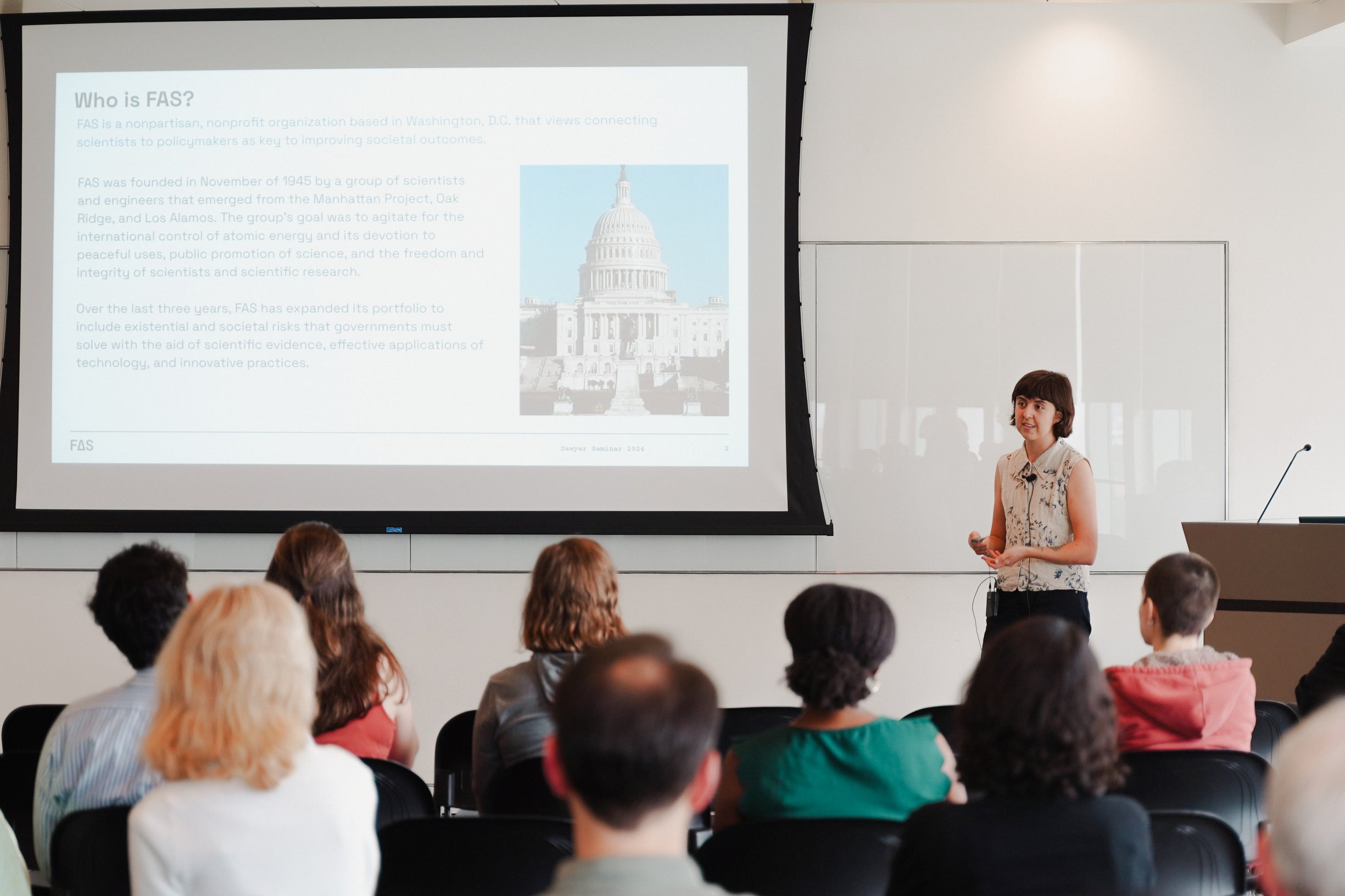Grace Wickerson Speaks on Advancing Health Equity in Medical Innovation at Rice University
On September 12, the Medical Humanities Research Institute (MHRI) at Rice University had the privilege of hosting Grace Wickerson, a 2019 Rice alum and current Health Equity Policy Manager at the Federation of American Scientists (FAS), for an engaging talk on “Changing the System: A Policy Agenda to Achieve Health Equity in Medical Innovation.” Wickerson's work at FAS, a Washington, D.C.-based organization that connects scientists to policymakers, is aimed at ensuring scientific evidence drives policy changes that improve societal outcomes — particularly in the realm of healthcare. Their talk was the first in a series of public lectures in MHRI's "Reimagining Technologies of Care: Racial Health Equity and Data Justice" Sawyer Seminar, supported by the Andrew W. Mellon Foundation.
The Federation of American Scientists: History & Mission
Founded in 1945 to promote the peaceful use of atomic energy, FAS has since expanded its focus to include societal risks that governments must address with the aid of scientific evidence and technology. Over the last three years, FAS has grown its portfolio to encompass issues such as health equity, artificial intelligence, climate change, and advancing racial equity in healthcare. At the heart of this work is policy entrepreneurship—a term Wickerson described as using the full suite of tools, knowledge, and individual acumen to push policy ideas forward, creating meaningful change.
Health Equity and Innovation: Addressing Bias in Medical Technology
Wickerson's talk zeroed in on the troubling disparities in medical technology, particularly in the design, testing, and approval processes that overlook marginalized populations. One of their major projects focuses on pulse oximeters, a critical tool used in hospitals to measure oxygen levels in the blood. Research has shown that pulse oximeters are significantly less accurate for patients with darker skin, which has resulted in delayed care and worsened outcomes for Black patients.
They explained how the FDA's 510(k) and de novo approval pathways—intended to accelerate the approval of new medical devices—have contributed to these disparities by allowing devices to bypass rigorous diversity testing. Wickerson emphasized that the key to reducing bias in devices is not just regulation, but the creation of diverse clinical trials and equitable technological development from the ground up.
The Power of Policy Entrepreneurship
In outlining the steps to meaningful policy change, Wickerson detailed a three-step process:
- Define the challenge or opportunity.
- Diagnose the existing policies and where they fall short.
- Design solutions and policy tools to tackle the issues.
As someone who oversees FAS’s health policy portfolio, Wickerson spends much of their time advocating for better engagement of scientists and engineers in the policymaking process. Their own journey into this career began during their time at Rice, where they studied Materials Science and Nanoengineering and became involved in the local community. This, combined with their later experiences at Northwestern University, where they investigated gaps in engineering education around ethics and equity, led them to become a champion for health policy reform.
Expanding Health Equity Through Federal Policy
A key takeaway from Wickerson’s presentation was the urgent need to address bias in medical devices through a combination of new regulations and broader collaborations across sectors. They highlighted specific policies such as the NIH Revitalization Act of 1993, which required the inclusion of women and racial minorities in clinical trials, but noted that only 13% of NIH-funded trials currently meet these requirements. Similarly, while the FDA’s Prescription Drug User Fees Act of 2023 requires diversity action plans for new drug submissions, enforcement remains inconsistent.
Wickerson urged more action from government agencies including the CDC, NIH, and FDA, calling for expanded investments in diverse databases, equity audits of algorithms, and post-market reporting to ensure that devices and drugs are serving all populations effectively. They also noted that Medicare and Medicaid could play critical roles in promoting equitable healthcare by incentivizing digital health technologies that reduce disparities.
A Call to Action: Shaping the Future of Science and Policy
Wickerson left attendees with a powerful message: Scientists must be at the table when policy decisions are being made. By integrating scientific expertise into policymaking, we can create a healthcare system that serves everyone equitably, regardless of race, gender, or socioeconomic background.
Their talk served as a compelling reminder that health equity isn’t just a scientific issue—it’s a policy issue. For Wickerson, their work in health policy is about shaping the infrastructure in which scientists and engineers operate, ensuring that innovation and equity go hand in hand.
As Rice University students, faculty, and community members, we have the opportunity to join in this movement and work toward a future where medical innovation truly benefits everyone.
Key Takeaways:
- Pulse oximetry bias is just one example of how medical technology can perpetuate racial disparities if equity is not considered from the start.
- FDA pathways designed to accelerate innovation must include more rigorous diversity testing to prevent biased devices from entering the market.
- Policy entrepreneurship can be a powerful tool for scientists to advance equity in healthcare and beyond.
- The engagement of scientists in policy is crucial to addressing these challenges and shaping a more equitable healthcare system.
For more information about the MHRI's "Reimagining Technologies of Care: Racial Health Equity and Data Justice" series, including upcoming lectures, please visit mhri.rice.edu/sawyer.
photo credit: Owen Jin

